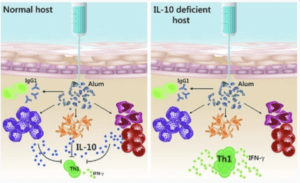Adjuvants are compounds added to vaccines to improve antigen-specific responses compared with vaccination with antigens alone. Aluminium Salts (alum) adjuvant discovered by Alexander Thomas Glenny in 1926, was first used in vaccines in the 1930s and is the most widely used vaccine adjuvant. Alum is known to primarily increase vaccine-induced antibody and Th2 immune responses . However, alum is a poor inducer of Th1 and cytotoxic immune responses, consequently alum has not been successfully used for vaccines against intracellular bacteria. The exact mechanism of alum induced innate immune responses, and why it inefficiently induces Th1 responses remains poorly understood. Researchers hypothesised that alum induces immunosuppressive molecules that directly inhibit Th1 responses, resulting in poor induction of Th1 immunity.
Immunosuppressive cytokine IL-10 has been shown to contribute to immune evasion and chronic viral and bacteria infection by suppressing T cell functions. Thus, Oleszcyka et al., aimed to determine the effect of alum on the induction of IL-10, and impact on adjuvant-associated immune responses. Researchers observed a significant increase in non-specific IL-10 production by innate and T cells in responses to alum vaccination of female C57BL/6 mice. Murine macrophages and dendritic cells, and human monocytes were shown to be the main IL-10 secreting innate cells in response to alum stimulation. Oleszcyka et al., showed that ovalbumin (OVA)-alum vaccination of IL-10 deficient mice resulted in significant induction of OVA-specific IFN-γ and IL-17 producing CD4 T cells compared to OVA vaccination alone. However, this alum adjuvant effect was not observed in wild type mice. Interestingly, the adjuvant effect of OVA vaccination in induction of OVA-specific IgG antibody responses was observed in both wild type and IL-10 deficient mice.
In summary, this research represents the first study to demonstrate a potential mechanism via which alum inhibits induction of Th1 responses. Where, alum induces IL-10 production predominantly via myeloid cells which results in immunosuppression of Th1 cells responses.
Article: Oleszcyka et al., 2018. The vaccine adjuvant alum promotes IL-10 production that suppresses Th1 responses. European Journal of Immunology.
Article by Cheleka AM Mpande












